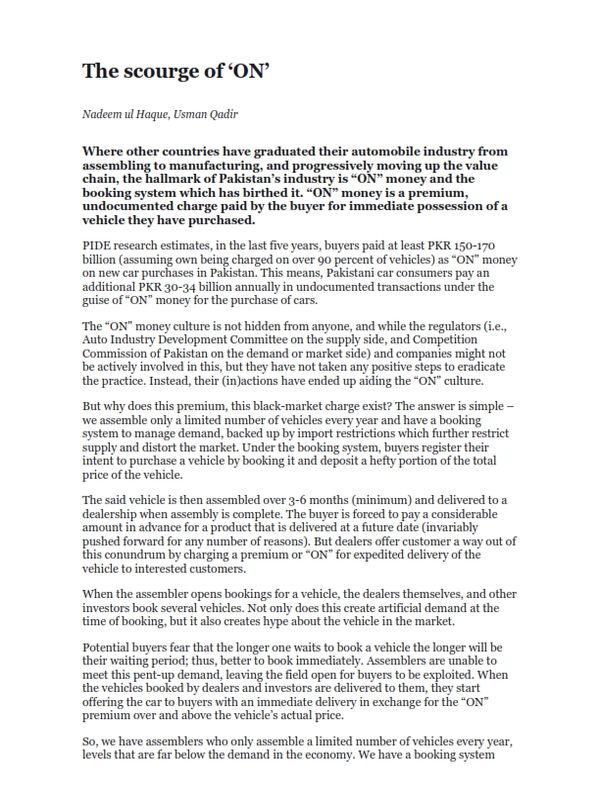The scourge of ‘ON’
Where other countries have graduated their automobile industry from assembling to manufacturing, and progressively moving up the value chain, the hallmark of Pakistan’s industry is “ON” money and the booking system which has birthed it. “ON” money is a premium, undocumented charge paid by the buyer for immediate possession of a vehicle they have purchased.
PIDE research estimates, in the last five years, buyers paid at least PKR 150-170 billion (assuming own being charged on over 90 percent of vehicles) as “ON” money on new car purchases in Pakistan. This means, Pakistani car consumers pay an additional PKR 30-34 billion annually in undocumented transactions under the guise of “ON” money for the purchase of cars.
The “ON” money culture is not hidden from anyone, and while the regulators (i.e., Auto Industry Development Committee on the supply side, and Competition Commission of Pakistan on the demand or market side) and companies might not be actively involved in this, but they have not taken any positive steps to eradicate the practice. Instead, their (in)actions have ended up aiding the “ON” culture.
But why does this premium, this black-market charge exist? The answer is simple – we assemble only a limited number of vehicles every year and have a booking system to manage demand, backed up by import restrictions which further restrict supply and distort the market. Under the booking system, buyers register their intent to purchase a vehicle by booking it and deposit a hefty portion of the total price of the vehicle.
The said vehicle is then assembled over 3-6 months (minimum) and delivered to a dealership when assembly is complete. The buyer is forced to pay a considerable amount in advance for a product that is delivered at a future date (invariably pushed forward for any number of reasons). But dealers offer customer a way out of this conundrum by charging a premium or “ON” for expedited delivery of the vehicle to interested customers.
When the assembler opens bookings for a vehicle, the dealers themselves, and other investors book several vehicles. Not only does this create artificial demand at the time of booking, but it also creates hype about the vehicle in the market.
Potential buyers fear that the longer one waits to book a vehicle the longer will be their waiting period; thus, better to book immediately. Assemblers are unable to meet this pent-up demand, leaving the field open for buyers to be exploited. When the vehicles booked by dealers and investors are delivered to them, they start offering the car to buyers with an immediate delivery in exchange for the “ON” premium over and above the vehicle’s actual price.
So, we have assemblers who only assemble a limited number of vehicles every year, levels that are far below the demand in the economy. We have a booking system which restricts the supply and exposes the buyer to the “ON” money premium. We also government policy which disincentivises the assemblers from increasing supply of vehicles or becoming more competitive, making an untenable situation even worse.
The government policy ends up aiding the “ON” culture by distorting the market. Originally, they need to shield domestic assemblers from foreign manufacturers till they became competitive. This meant that vehicles were not imported as a matter of course for sale in the domestic market, but only on a case-by-case basis. Under successful instances of infant industry protection local producers usually outgrow the need for this protection in about five to ten years. Unfortunately, our automobile industry is still stuck in its infancy after over 50 years.
When our current account deficit was surging out of control earlier this year, the government identified numerous goods that were contributing to the increase. Naturally, automobiles were part of this group, and the government banned their import for several months to curb the deficit. Setting aside the negligible impact of the ban on the current account, it adversely affected “ON” premium rates.
PIDE research suggests that the ON premium rate (ratio of ON money to the final price of the vehicle) averaged 7.92 percent in 2021. It jumped to an average of 15 percent after the ban was implemented, further adding to the woes of the buyer. Clearly, the government policy has so far not been able to rid the country of the scourge of “ON” money.
The “ON” has gone on for 50 years. No ministry/government agency regulates this “ON”. No one reviews this part of the undocumented economy that sucks up investment funds. Parliament or cabinet has never even debated this issue.
The consumers have no voice in this system!
What can be done to make a car market and move away from a car black market that prevails?
Copyright Business Recorder, 2023




